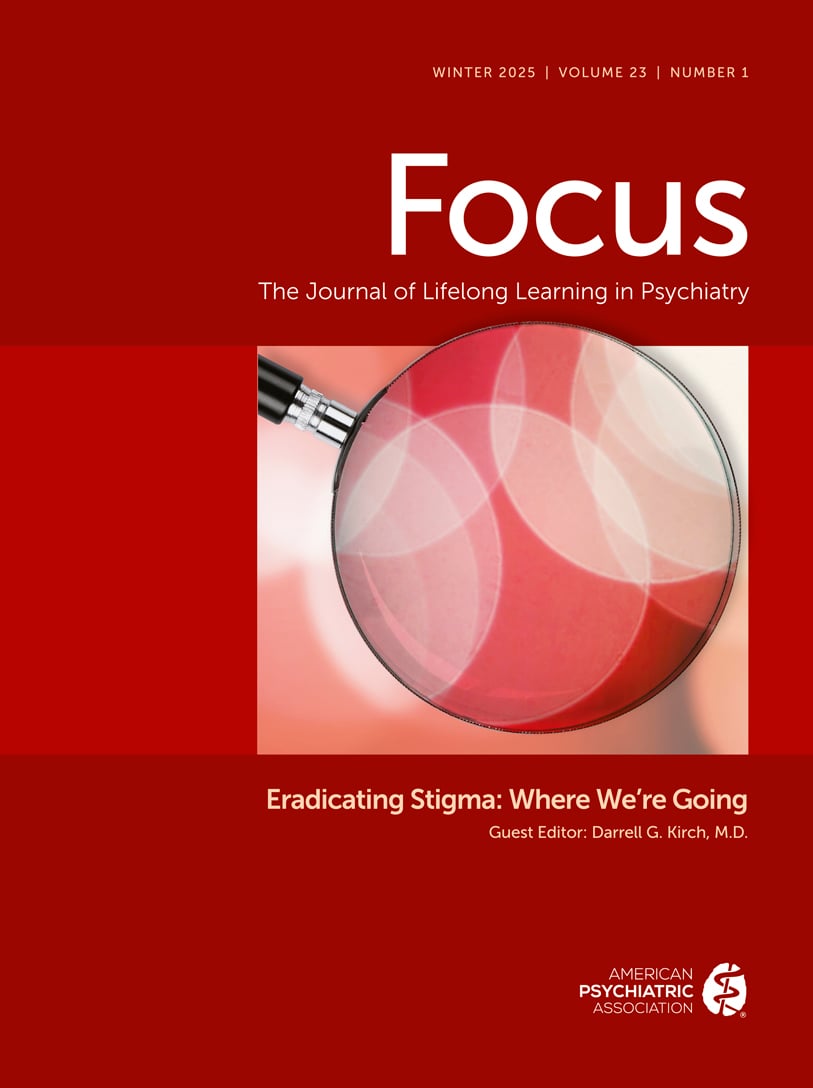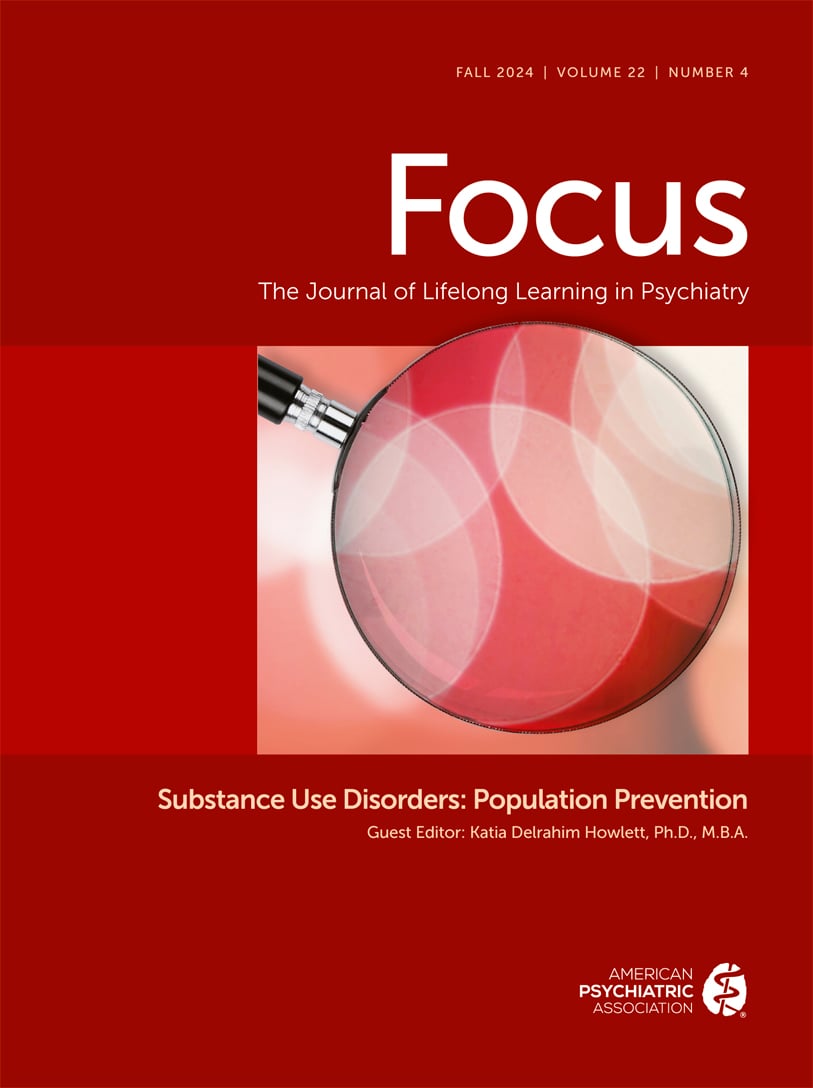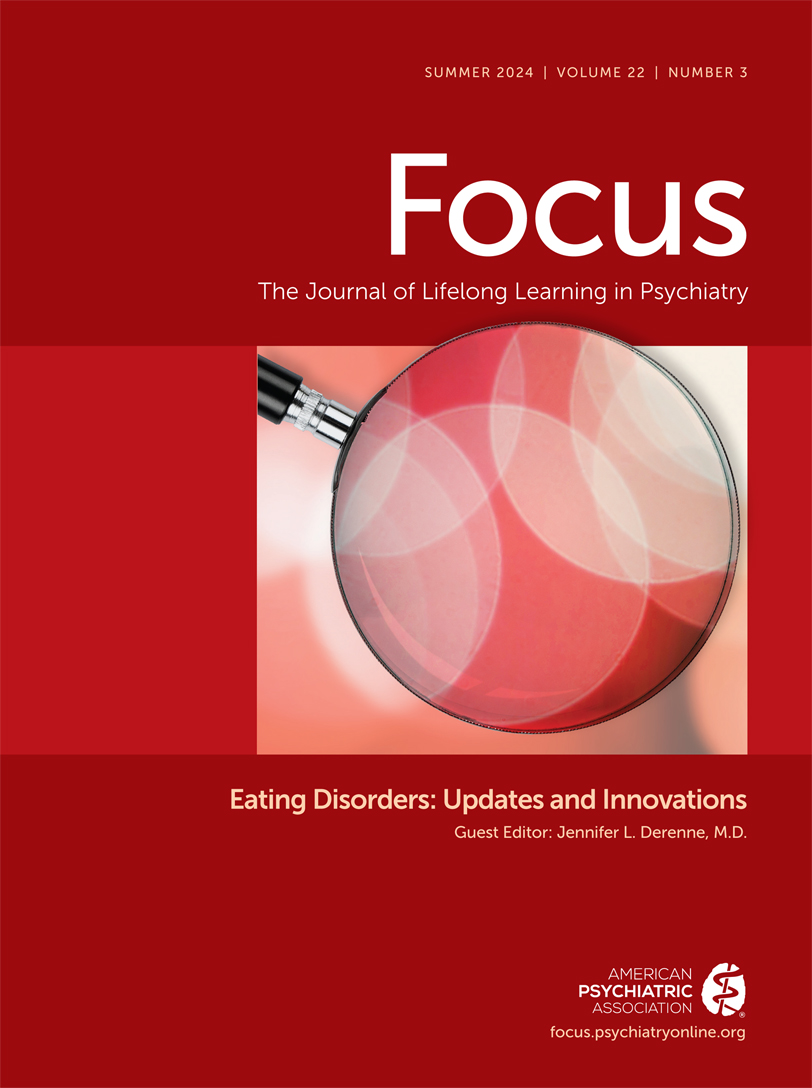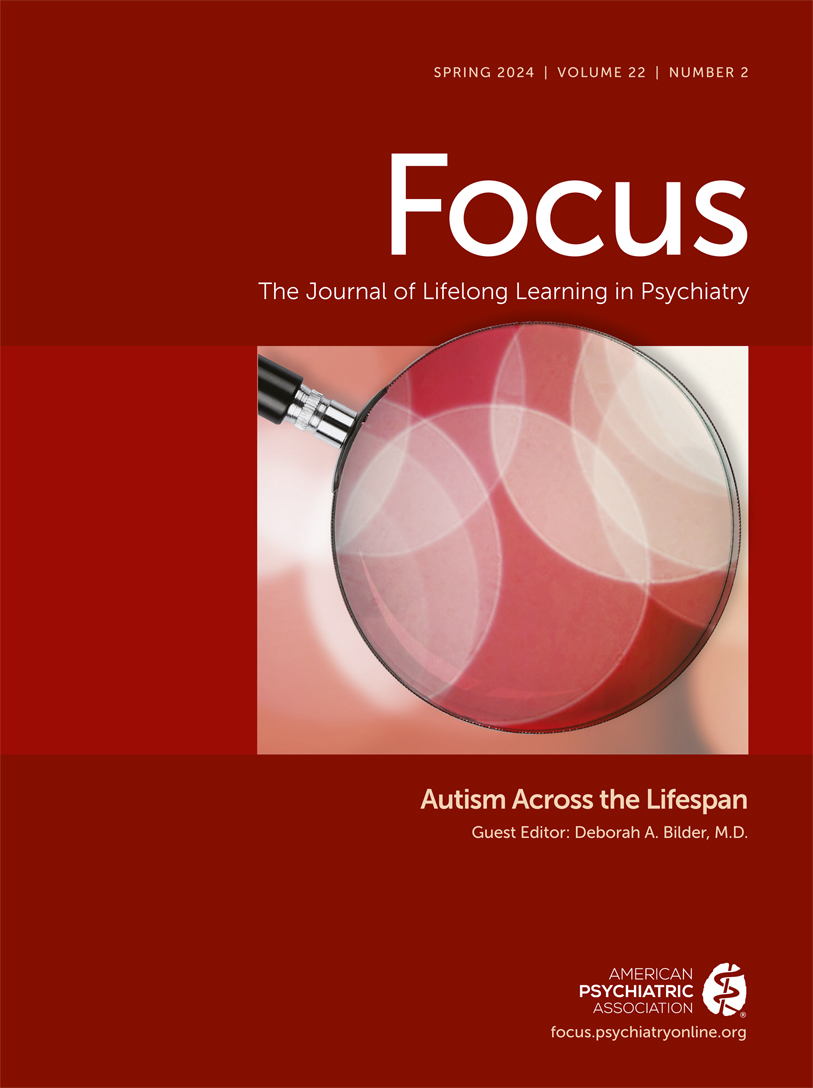Focus
- Volume 22
- Number 3
- July 2024
From the Guest Editor
Reviews
Publication date: 01 July 2024
Pages269–277In this review, the authors provide an update on the understanding of anorexia nervosa (AN) across the lifespan. Focusing on key pieces of literature from the past 5 years, this review summarizes recent updates to DSM-5 within the domain of AN, including ...
https://doi.org/10.1176/appi.focus.20230037Publication date: 01 July 2024
Pages278–287This article aims to review the current evidence-based psychotherapy and psychopharmacological treatments for adults and youths with bulimia nervosa (BN) and binge-eating disorder (BED). Treatments for adults and for children and adolescents are discussed ...
https://doi.org/10.1176/appi.focus.20240001Publication date: 01 July 2024
Pages288–300Avoidant/restrictive food intake disorder (ARFID) is an eating disorder recently codified in DSM-5 that affects individuals of all ages. A proliferation of ARFID research has emerged over the years, and this review provides a brief overview of the current ...
https://doi.org/10.1176/appi.focus.20240008Publication date: 01 July 2024
Pages301–306Eating disorders may result in medical complications that affect every body system with both acute and chronic consequences. Although some medical complications may require acute medical hospitalization to manage, other complications, such as low bone ...
https://doi.org/10.1176/appi.focus.20230042Publication date: 01 July 2024
Pages307–311This article reviews the latest research on pharmacological management of eating disorders, including anorexia nervosa (AN), bulimia nervosa (BN), binge-eating disorder (BED), and avoidant/restrictive food intake disorder. Recent literature for both youth ...
https://doi.org/10.1176/appi.focus.20230043Publication date: 01 July 2024
Pages312–321Historically, eating disorders (EDs) have been conceptualized from a female-centric lens. However, consistent research demonstrates that EDs afflict individuals across the gender spectrum, including cismales and gender-diverse individuals. Despite this ...
https://doi.org/10.1176/appi.focus.20230039Articles
Publication date: 01 July 2024
Pages322–327Many individuals with eating disorders and their family members are well-informed about advances in science that could affect the treatment and outcome of these illnesses. They appropriately apply this knowledge to evaluate available treatments and ...
https://doi.org/10.1176/appi.focus.20230040Publication date: 01 July 2024
Pages328–332Eating disorders are severe psychiatric illnesses that are associated with high mortality. Research has identified environmental, psychological, and biological risk factors that could contribute to the psychopathology of eating disorders. Nevertheless, ...
https://doi.org/10.1176/appi.focus.20240006Publication date: 01 July 2024
Pages333–338When valued and recognized for the insights gained through direct lived experience, people in eating disorder recovery and their caregivers can improve treatment outcomes. From direct care delivery—in the form of peer support—to roles in leadership, ...
https://doi.org/10.1176/appi.focus.2024000221st-Century Psychiatrist
Publication date: 01 July 2024
Pages339–341Unlike psychopharmacologic interventions for other psychiatric conditions, few medications have emerged as helpful in improving eating disorder cognitions and evidence-based psychotherapies fail many patients. Novel treatments are urgently needed to ...
https://doi.org/10.1176/appi.focus.20230041Ask the Expert
Ethics Commentary
Performance in Practice
Publication date: 01 July 2024
Pages350–368Eating disorders are characterized by significant disturbances in eating patterns associated with negative attitudes toward one’s body, weight, and shape. They are associated with an increased risk of mortality and morbidity as well as significant health, ...
https://doi.org/10.1176/appi.focus.20240009Bibliography
Abstracts
Influential Publications
Publication date: 01 July 2024
Pages373–380Anorexia nervosa (AN) has the highest mortality rate of any psychiatric disease, yet available pharmacological treatments are largely ineffective due, in part, to an inadequate understanding of the neurobiological drivers that underpin the condition. The ...
https://doi.org/10.1176/appi.focus.24022012Publication date: 01 July 2024
Pages381–387Anorexia nervosa (AN) is a deadly illness with no proven treatments to reverse core symptoms and no medications approved by the US Food and Drug Administration. Novel treatments are urgently needed to improve clinical outcomes. In this open-label ...
https://doi.org/10.1176/appi.focus.24022013Publication date: 01 July 2024
Pages388–399Objective: The main purpose was to evaluate the efficacy and tolerability of different medications used to treat bulimia nervosa (BN). Methods: Randomized controlled trials (RCTs) were identified from published sources through searches in PubMed, Cochrane ...
https://doi.org/10.1176/appi.focus.24022011Publication date: 01 July 2024
Pages400–417Objective: This systematic review sought to understand the effectiveness of lived experience mentoring, by people recovered from an eating disorder, with clinical samples currently receiving eating disorder treatment. Methods: The systematic review was ...
https://doi.org/10.1176/appi.focus.24022015Publication date: 01 July 2024
Pages418–429Substantial progress has been made in the understanding of anorexia nervosa (AN) and eating disorder (ED) genetics through the efforts of large-scale collaborative consortia, yielding the first genome-wide significant loci, AN-associated genes, and ...
https://doi.org/10.1176/appi.focus.24022014Past Issues
View Issues Archive
Vol. 23 | No. 1

Vol. 22 | No. 4

Vol. 22 | No. 3
